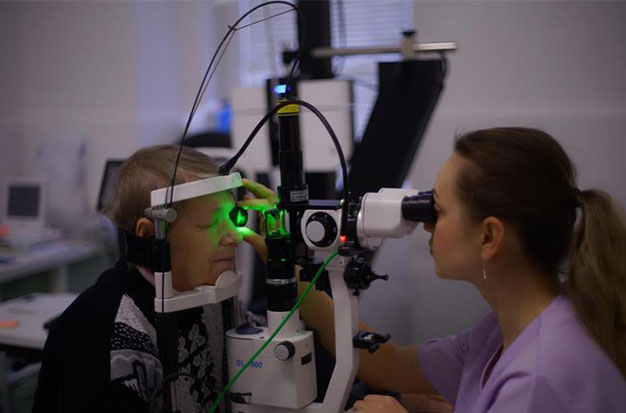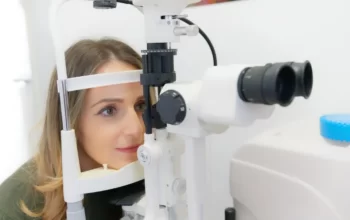
Although cataracts come with a variety of annoying symptoms, may cataracts also result in headaches?
Although it’s quite rare that cataracts are the actual cause of your headache, they can nonetheless exacerbate one. In these circumstances, a Houston cataract specialist’s care for your cataracts may help to reduce your headaches.
Discover which eye problems are most likely to be the source of headaches, how cataracts can cause headaches, and early indicators of cataracts.
Types Of Headaches
Various types of headaches can occur, including:
- Migraines: Migraines are a chronic type of headache that has various triggers, such as hormones, certain foods, and sleep problems.
- Tension: Tension headaches can develop from tight muscles in the neck, face, and shoulders.
- Cluster: Cluster headaches can involve intense pain often in one side of the head that comes in a cyclical pattern. They may occur every day for a few weeks. The intense pain may last anywhere from a few minutes to a few hours.
- Sinus: Sinus headaches can develop due to a sinus infection or sinus congestion.
Headaches can also develop from overtaking certain types of medications, dehydration, and eye problems. Continue reading below to learn more about how eye issues are associated with headaches.
Can Cataracts Cause Headaches?
An elderly patient getting screened for cataracts At Byrd Eye Clinic, the ophthalmology practice of Dr. Thomas Byrd, we take great pride in providing top-notch ophthalmological treatment close to home. Modern choices for cataract treatment are among the many high-quality eye care services that Dr. Byrd and his staff offer patients. Byrd Eye Clinic offers cataract therapies that enable our patients to obtain prompt, successful cataract surgery and protect their priceless eyesight for life, avoiding what continues to be one of the main causes of avoidable blindness worldwide.
In addition to receiving outstanding eye treatment with unwavering professionalism and a soft touch, patients may anticipate receiving simple, plainspoken information regarding their ocular health. It’s crucial for cataract patients to understand the symptoms of their condition so they can get a fast diagnosis and treatment, but it’s also crucial for them to know which of their symptoms are unrelated to cataracts so they may have realistic expectations for their care.
For instance, during consultations at our eye care facility in Detroit, MI, several of our cataract patients question Dr. Byrd if cataracts might induce headaches. Dr. Byrd is delighted to respond to this inquiry because it is logical. He wants to make sure that these patients are aware, though, that cataracts typically do not result in headaches and that cataract surgery does not always make them go away.
Is There A Connection Between Cataracts And Headaches?
While it is true that cataracts generally do not cause headaches, there may be a connection between cataracts and headaches among some people. In their earliest stages, cataracts do not usually interfere with a person’s vision all that much. However, as cataracts become more severe, and a person’s vision becomes increasingly clouded, he or she will have to work harder to see clearly, squinting and holding materials close to his or her face in order to read them. As a result, that person may start to develop headaches related to eye strain. Likewise, people who are already prone to headaches may find that this overuse of their eyes makes the headaches even worse or triggers their onset. However, once again, this is different from stating that cataracts cause headaches.
While it’s true that cataracts often don’t cause headaches, some people may experience a link between cataracts and headaches. Cataracts typically do not significantly obstruct a person’s vision in their early stages. Nevertheless, when cataracts worsen and a person’s vision becomes more blurry, they will have to strain more to see well, squinting and bringing things near to their faces to read them. As a result, they could begin to experience headaches brought on by eye strain. Additionally, those who are already predisposed to headaches may discover that this excessive use of their eyes worsens their symptoms or initiates headaches. Yet again, this is distinct from asserting.

Reasons For Headaches After Surgery
Both cataracts and cataract surgery are unlikely to result in headaches. The clouding of the lens known as a cataract can affect eyesight. Eye strain and squinting are two symptoms of poor eyesight that can result in headaches and discomfort.
Below are examples of cataract surgery side effects:
- Redness
- Swelling
- Blurry vision
- Seeing halos or glares around lights
- Pain
The pain, swelling, and redness that can develop following cataract surgery often go away within a few days to a few weeks. Pain and discomfort in the eye, its surrounding area, and the incision site may resemble a headache. An over-the-counter analgesic and/or anti-inflammatory eye drops can typically be used to treat this.
Although headaches are uncommon after cataract surgery, discomfort and eye pain are occur. Typically, this discomfort is not a cause for alarm and can be readily treated at home.
Can Cataracts Cause Ocular Migraines?
Ocular migraines are not brought on by cataracts. A decrease in blood flow in the eye’s blood vessels is what causes ocular migraines. Although visual blurring brought on by ocular migraines may resemble that brought on by cataracts, the blurred vision brought on by ocular migraines should go away as the migraine does.
What Are The Typical Cataract Symptoms?
Do you think you might have cataracts? If so, you might be wondering what cataracts’ first symptom is. Although individual cataract symptoms can vary, you’re more likely to suffer any of the following symptoms before a headache caused by a cataract:
- Blurred, cloudy, or double vision
- Difficulty seeing at night
- Fading or yellowing of colors
- Frequent prescription changes
- Halos
- Light sensitivity
Conclusion
People who previously experienced migraines and headaches may find that the added pressure on their eyes causes them to have headaches more frequently or more frequently.
However, as opposed to cataracts themselves, both of these circumstances are aggravations of things that may already be headache-causing. Whether or whether you have had cataract surgery, it is highly advised that you consult a doctor if you start experiencing new, excruciating headaches.



